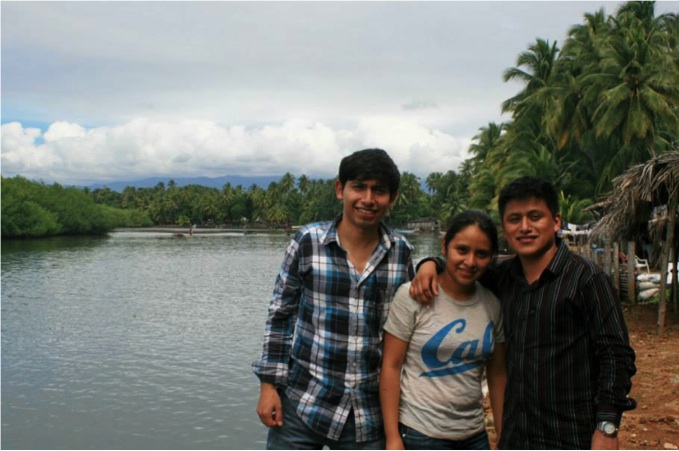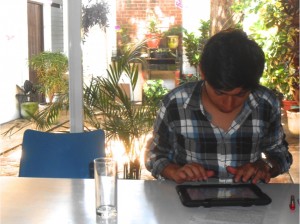Stories that Matter: Karachi-San Salvador
0December 16, 2014 by Tom McKenna

 by Jennifer Coreas
by Jennifer Coreas
ConTextos, EscriVamos
San Salvador, El Salvador
Andover Bread Loaf, 2014
Why not us? Why couldn’t we work together to extend our writing overseas as much as we had extended our minds? Those were the questions that Moshin Tejani and I asked ourselves as we worked together to develop our first student work exchange.
Moshin and the teachers and directors of the program welcomed me as family during my first summer at Andover Bread Loaf. A teacher trainer and writing workshop lead teacher for ConTextos in El Salvador, I was amazed at how the Bread Loaf Teacher Network brought educators, poets, artists, and activists together to discuss the power and influence of writing in creating communities and classrooms as places where expression was always encouraged and celebrated.
Through poetry, conversations, dinners, and laughter, Moshin and I realized that our countries had much more in common than what we originally had thought. Pakistan and El Salvador share stories of violence and poverty linked to illiteracy in their communities. International studies show a strong correlation between low levels of literacy and high levels of violence and indicate that literacy is a powerful tool for both prevention and rehabilitation. Moshin and I talked about these things. We talked about the mechanics of writing, dictation, and memorization in the schools in our countries. We felt as if we were talking about the same place.
During our visit to Bread Loaf School of English in Vermont, Pat and David’s (Patricia Echessa-Kariuki and David Wandera) stories of change through writing and global interaction both moved and thrilled us. Their work inspired us to ask the question: Why not us? Moshin and I developed the parameters for an exchange that would involve students from The School of Writing in Karachi, Pakistan, and students from the writing program of ConTextos, EscriVamos in San Salvador, El Savador.
From the beginning, we wanted our role to be as important as that of the participants. We wanted to experience the wonder, excitement, and surprise that only stories can bring. Keeping the exchange small and simple was crucial. We decided to start with only three students from each country. As we packed to return to our homes, we packed the promise to make the exchange happen.
When I first presented the idea at ConTextos, the members were as enthusiastic as I was. They knew that El Salvador and Pakistan were to share newspaper headlines for the first time. I wanted my students from the writing workshop “Soy Autor: Escritura Creative para la Paz” (I am an author: Creative Writing for Peace) to be the participants. This was challenging because younger students have more difficulty moving from place to place in the city. Their parents have concerns about the students’ safety when riding buses and traveling. We decided to invite our awesome teachers who work with us as volunteers creating didactic materials and serving as teacher fellows for the reading/writing workshops ConTextos develops to be the participants. Mohsin, also, had thought of teachers as participants. They would be from the “Dream Trust Foundation School” run by Humaria, a leader in her community.
Since we have started, there have been no doubts that this initiative sparks curiosity and questioning, which, in turn, engages participants to think deeply about their surroundings. These skills form the basis to propose new ideas, to become stakeholders, and to become agents of change. Our first six teacher participants have realized that reading and writing go beyond memorization and dictation and actually serve as a bridge to connect to others around the world.
Karachi and San Salvador Exchange
Stories that Matter
“My life is boring. I don’t really want to write about it,”said Emilio after reading aloud the first letter he wrote, based on the prompt, “why did I decide to become a teacher?” Although Emilio talked about what being a teacher meant to him and the satisfaction of being part of a change in the world, he never really freely opened up. While reading, his voice was soft and his arms locked up against each other. Writing and sharing something about one’s life sounds unnatural and irrelevant after spending a lifetime in a classroom, where the only stories written are the ones that are transcribed or dictated by the teacher. In most cases, writing in Salvadoran contexts is not a tool to externalize feelings and emotions through personal narrative.
During our group revision, Laydi and Geovany also read their stories. Unlike Emilio, they shared moments of struggle, laughter, and hard work. As they were reading, Emilio could not stop snapping his fingers, an active listening routine we had introduced. After sharing, we returned to our pieces to work on story mapping with a focus on the audience to whom we were writing. Knowing his audience has changed the way Emilio writes. He realized that a person miles away was eager to hear his story. He took a chance on being vulnerable. “I started going to school when I was four years old. I used to walk for an hour every day with my siblings, five of them, in the narrow trails on our way to the school.” He wrote, “There was a time that I didn’t have Internet or a calculator to go through match exercises. Sometimes, the boys would play outside and that made me feel envious of them, because they could spend their days playing while I was doing homework indoors”.
When the first response letter arrived, Emilio was excited and nervous. He read aloud in a soft whisper to himself, laughing sometimes, frowning his eyebrows at other times. Emilio smiled back at me with satisfaction. His story was indeed treasured for the first time. “I know now that my story is not boring. I like that Junaid asks me a lot of questions. He really wants to know about me.” We are working on revising the new response letters to our friends in Karachi. Emilio´s first draft is full of human connections and shows a wide open door to his life in El Salvador. He talks about the Spanish slang we use, the unique experience of traveling in a public bus, and the funny fact that we Salvadorans eat our own national flower “Flor de Izote.” Emilio is now enthusiastic about sharing every bit of his culture, his country, and himself with his new friend Junaid.
Category BLTN Global, BLTN International, Fall 2014 | Tags:



Leave a Reply